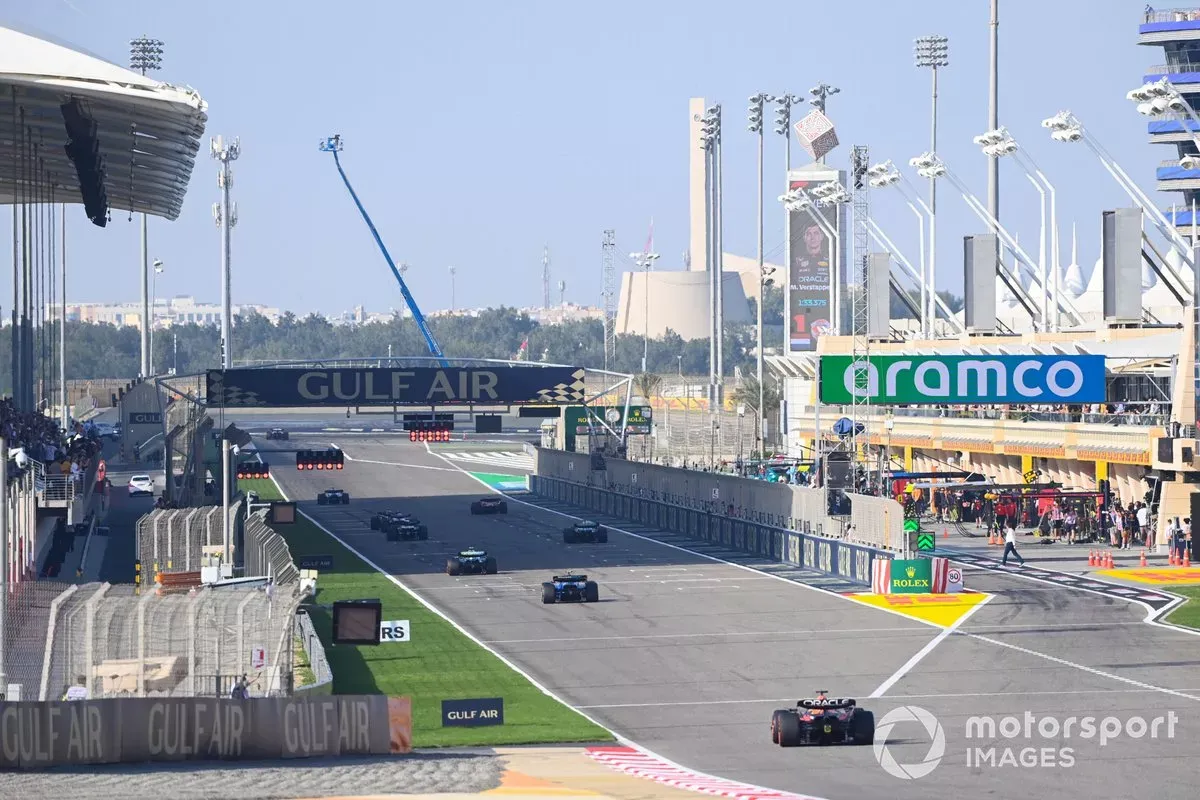Formula One News
Fernando Alonso hogged the headlines at the end of Friday practice for the Formula 1 2023 opener, but looking a little closer it wasn’t hard to spot the standout performers. Max Verstappen and Sergio Perez are in a threatening position going into the Bahrain Grand Prix, but can Aston Martin led by Alonso take on the charging Red Bulls?
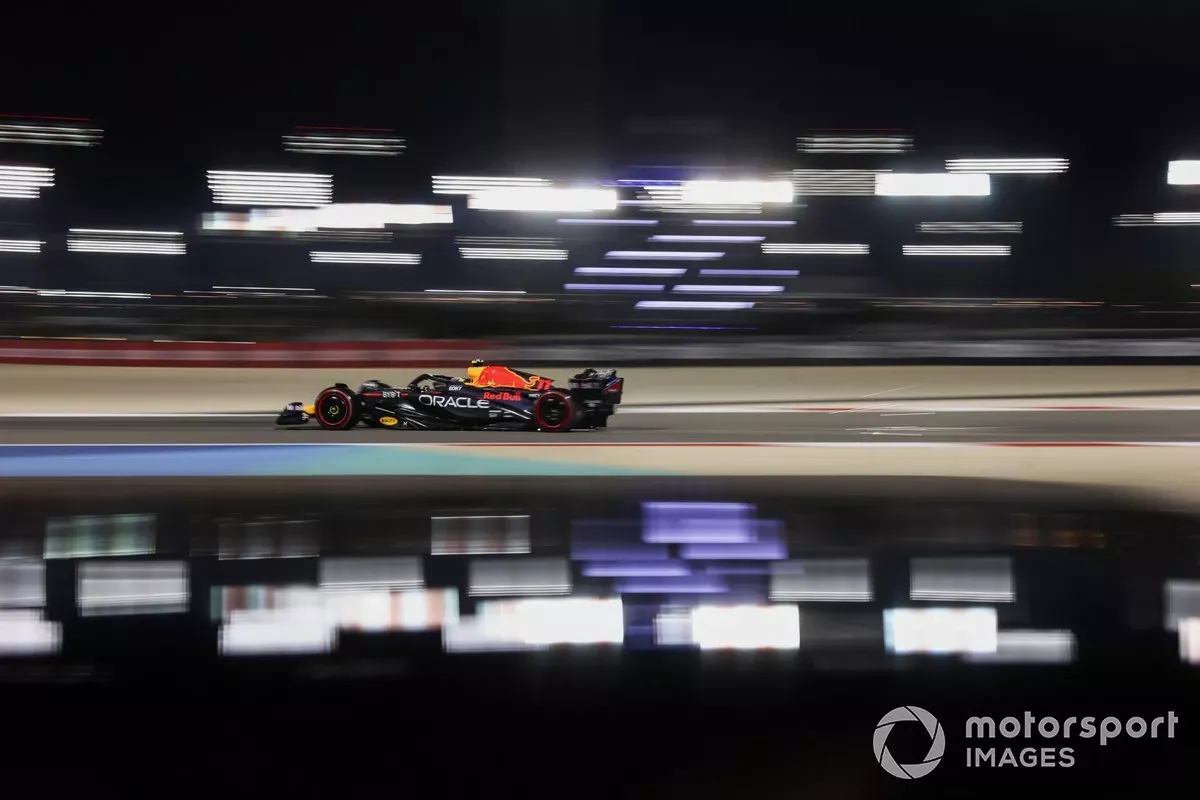
Fernando Alonso and Aston Martin backed up their promising Formula 1 2023 testing form with the quickest time in the opening practice running for the Bahrain Grand Prix, but pre-season favourites Max Verstappen and Red Bull are lurking close behind.
In fact, judging by the times logged in the late-FP2 race data gathering exercises and based on information supplied from sources from the paddock, right now it seems Red Bull remains the red-hot favourite for victory in the first race of the season. Behind, Ferrari’s potential remains clouded, while there’s fears of a sobering start to 2023 at Mercedes.
Here’s everything we learned on Friday at the 2023 Bahrain Grand Prix.
The story of the day
As is typical in the Bahrain event’s split day/night timetable, FP1 took place in the sunny and hot conditions that aren’t representative of the sessions that matter this weekend: qualifying and the race.
Several teams, including Ferrari and Mercedes, therefore eschewed even running the soft tyres, which Red Bull’s Sergio Perez used to top the times on a 1m32.758s, in FP1. Verstappen trailed in third, surprisingly feeling that he couldn’t replicate his very positive car balance feeling from testing.
Alonso was second behind Perez, his best effort late on the softs coming in 0.438s adrift. The most-high profile moment of the session was Carlos Sainz’s high-speed spin into the huge runoff area behind the Turns 9/10 plunging double left complex in his Ferrari.
Motorsport.com ventured trackside during the opening session and, from our vantage point inside the Turn 4 exit, it was clear the Red Bulls were the only cars not regularly struggling with rear-end instability as they planted the power out of the tricky, fast right-hand open hairpin at the end of the track’s second straight and DRS zone.
The Ferrari drivers looked solid most of the time, while Lewis Hamilton and George Russell were regularly snapping left as they fought to avoid going beyond track limits on the exit. Intriguingly, so did Alonso – the Spaniard catching a big sideways moment just before the halfway mark. But this didn’t appear to impact his pace once he switched to the softs.
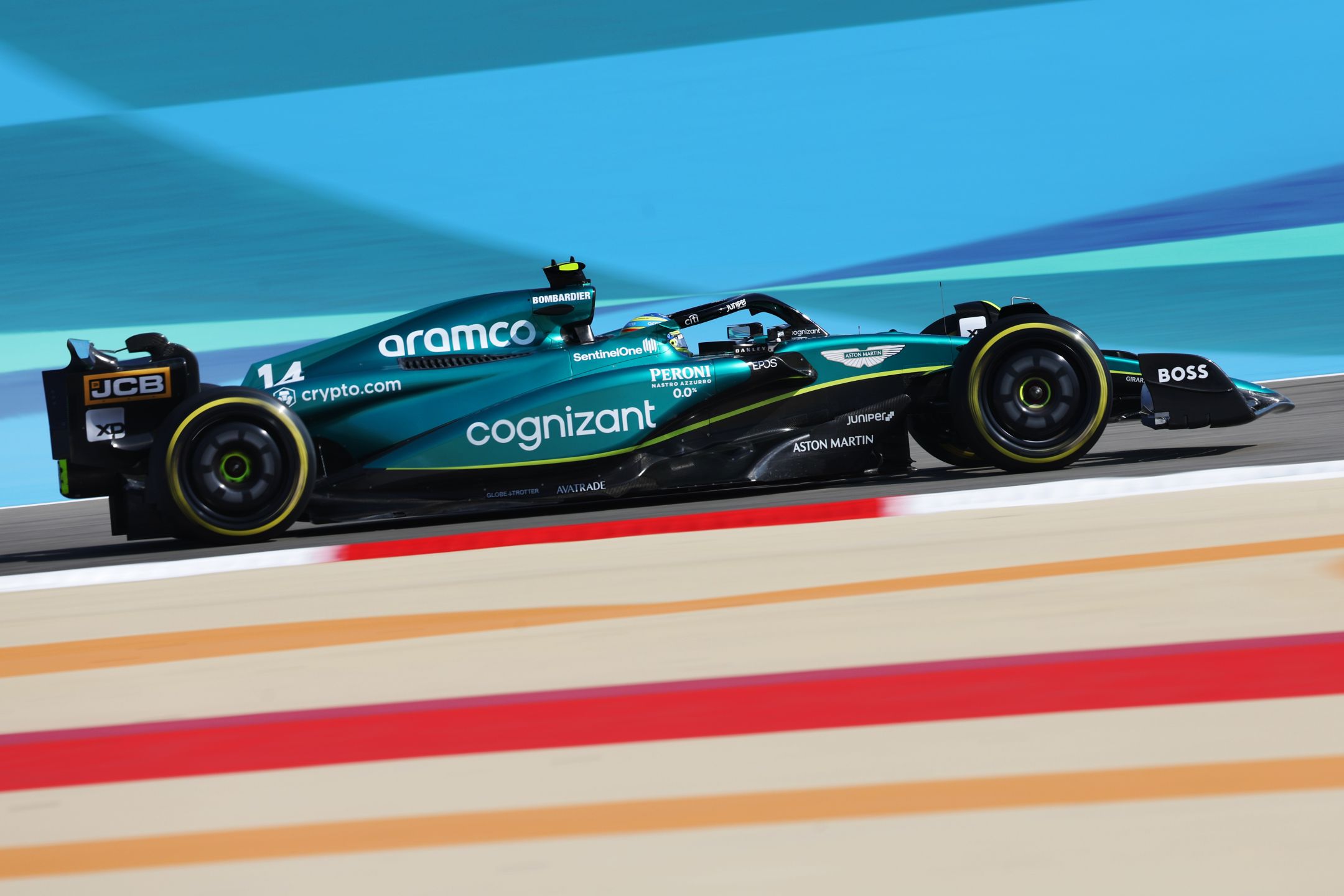
That speed didn’t stop when the lights came down for FP2, and indeed Alonso went 2.289s quicker than he managed in FP1 to top the second session with a 1m30.907s. That resulted in a gap of 0.169s to Verstappen in second. Just behind, Leclerc was only 0.12s slower than Verstappen in fourth overall for Ferrari – as Sainz finished FP2 in 14th with an SF-23 he says "doesn't feel the same as it did in testing" and "is not exactly responding, as I expect or as it did in testing".
As is customary at the end of FP2, the teams switched from qualifying simulation efforts to their long-run data-gathering programmes. In this running, Lance Stroll was spotted taking his left hand off his steering wheel in the other Aston. He used that palm to help rotate the wheel sufficiently, while helping support the right hand he injured in a mountain bike accident 13 days ago and revealed on testing’s eve.
Another standout feature of the second session was 13 drivers ending up being covered by a one-second margin, with the Mercedes drivers down in eighth and 13th in the middle of this gaggle. That close spread has raised expectations a big driver or indeed a whole team could have a shock qualifying exit in the opening elimination segments on Saturday.
Verstappen’s 15-lap stint just about led the way on the race pace averages ahead of Alonso. In it, the Dutchman produced a consistent run and ended up lapping quicker than he started
Data that Motorsport.com has seen suggests on their respective quickest FP2 laps that the Mercedes drivers were losing significant time to Alonso in the fast, sweeping corners of Turns 6 and 7 at the start of the second sector, as well as in the rapid, uphill left of Turn 11 at the end of the back straight.
While Alonso’s Aston performed strongly here, it has been suggested the Red Bulls were running in a lower engine mode on Friday, which means it could yet threaten Aston’s performance in these corners (as Verstappen nearly did in any case) come qualifying.
It has also been suggested that Ferrari is yet to show its full potential on engine power too, and while there could also be more to come from Mercedes in this area, the team’s drivers were still notably struggling for rear-end grip in FP2. The Black Arrows squad feels it still has work to do to improve its handling balance overall.
Behind the leading teams, Nico Hulkenberg produced an eye-catching qualifying simulation on his return to F1 action for his new team, Haas. But rival squads reckon the veteran German driver was likely running lighter on fuel when he set his 1m31.376s soft tyre flier.
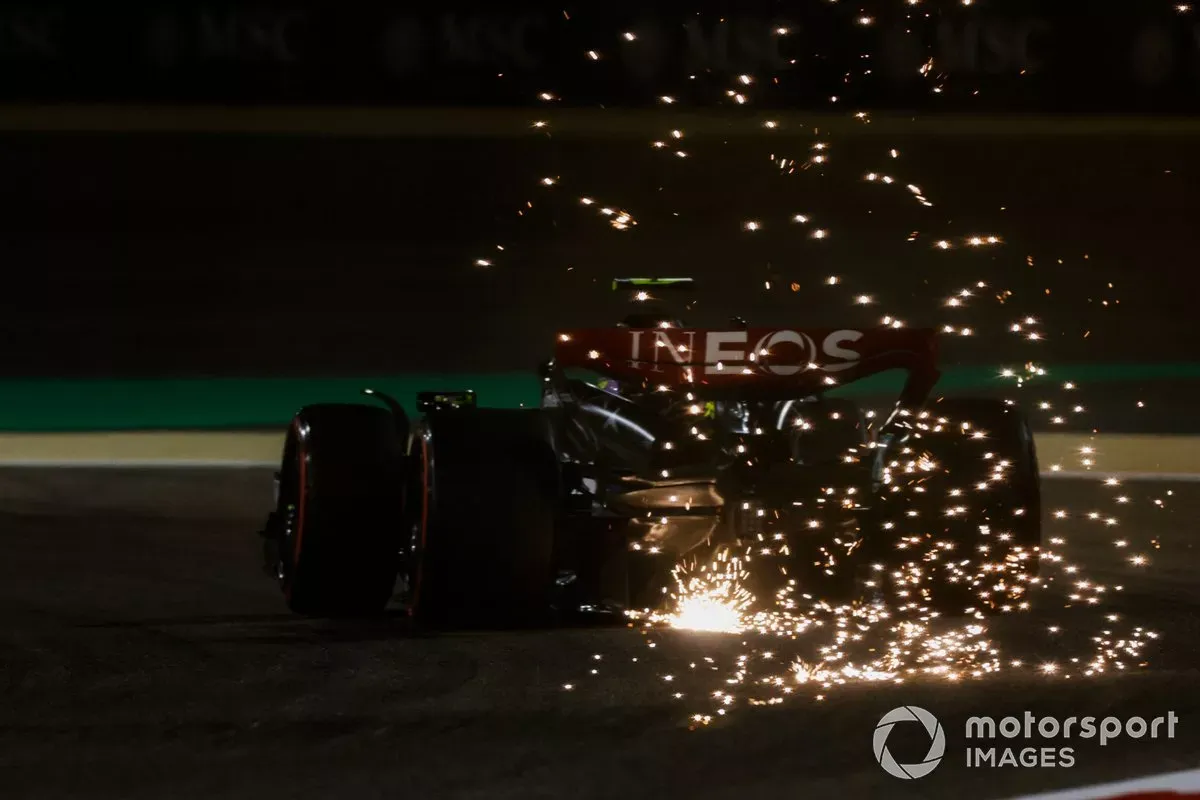
How Aston Martin and Red Bull stack up on race pace
For the first time in 2023, we must remind you of the usual caveats when looking at long-run pace averages: that fuel loads tend to vary considerably and engine modes go up and down from team to team. As we’ve already covered, the same applies to single lap pace too.
Therefore, on first glance, the times produced on the C3 softs long running by Alonso and Aston during the late FP2 race simulations appear very competitive.
This compound is expected to be the favoured race tyre (the previous construction was used for leader Leclerc’s opening two race stints in the 2022 race), given the teams racked up the miles on it during testing last week – when it was the middle compound in Pirelli’s whole range for the season. A switch for most to end the race on the hards is predicted at this stage to be the optimum tyre strategy.
Verstappen’s 15-lap stint just about led the way on the race pace averages ahead of Alonso, as can be seen below. In it, the Dutchman produced a consistent run and ended up lapping quicker than he started – suggesting his rubber was holding on well despite the coarse Bahrain track surface that makes this event a performance outlier for all teams (another important caveat this weekend).
There are here two important factors to consider that, as things stand, pile expectations of Red Bull making good on its pre-season promise despite the unexpected balance shifts across lower-fuel running to higher on Friday, per Verstappen.
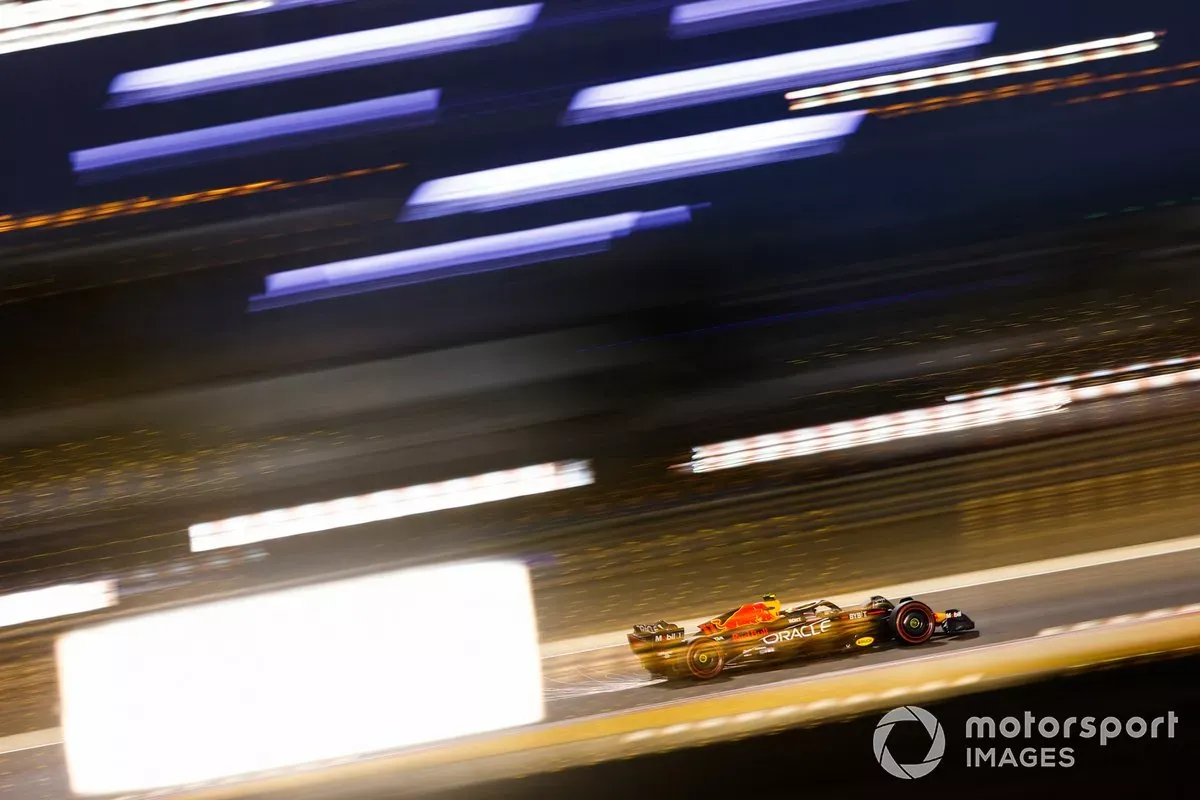
First is that Alonso’s final times in his 13-lap soft tyre stint were nearly two seconds slower than the pace he started off producing. And while his long run was still impressive overall, pack pace could yet compress in Sunday’s race.
There, Mercedes expects to be closer to Ferrari, which is also predicted to maintain its form from 2022 – qualifying strongly and then struggling more on longer stints, with Leclerc’s leading softs time in FP2 clocked shorter than any other team on this compound bar Haas. Nevertheless, the Scuderia was striking a downbeat tone as the paddock action wound down on Friday night.
But it is an unseen factor that surely cements Red Bull’s place as favourite for Bahrain GP success – even though the usual practice smoke-and-mirrors games could throw up a shock. This is based on the understanding that correcting Verstappen’s long run for the set high fuel load he was clearly running and he is thought to be “in a league of his own” on race pace, per a rival team member.
"In the long run, with all the changes we made, I was quite surprised that it was the pace we had" Max Verstappen
Hamilton’s comments reinforce this, with the seven-time world champion saying “[compared] to Red Bull, it looks just looking at the long runs, they were a second lap faster”. And indeed, even Perez’s average on the softs came in at 0.471s slower each time by compared to his team-mate.
What they say:
Max Verstappen: “FP1 was really bad. I just couldn't get a balance, which was a bit odd because in testing whatever we tried – ok, some things were maybe not amazing – but not that far out. So, a few things to understand. Even the start of FP2 was a bit difficult. But then for the final run, even though [I was] not really having a good reference and confidence up until then in the car, the lap was not too bad in the short run. And also, the car felt a bit more connected.
“And then in the long run, with all the changes we made, I was quite surprised that it was the pace we had. Overall, the car is not too bad in the long run. I just need to find my rhythm again with the car and just the way the car is driving from short run to long run.”
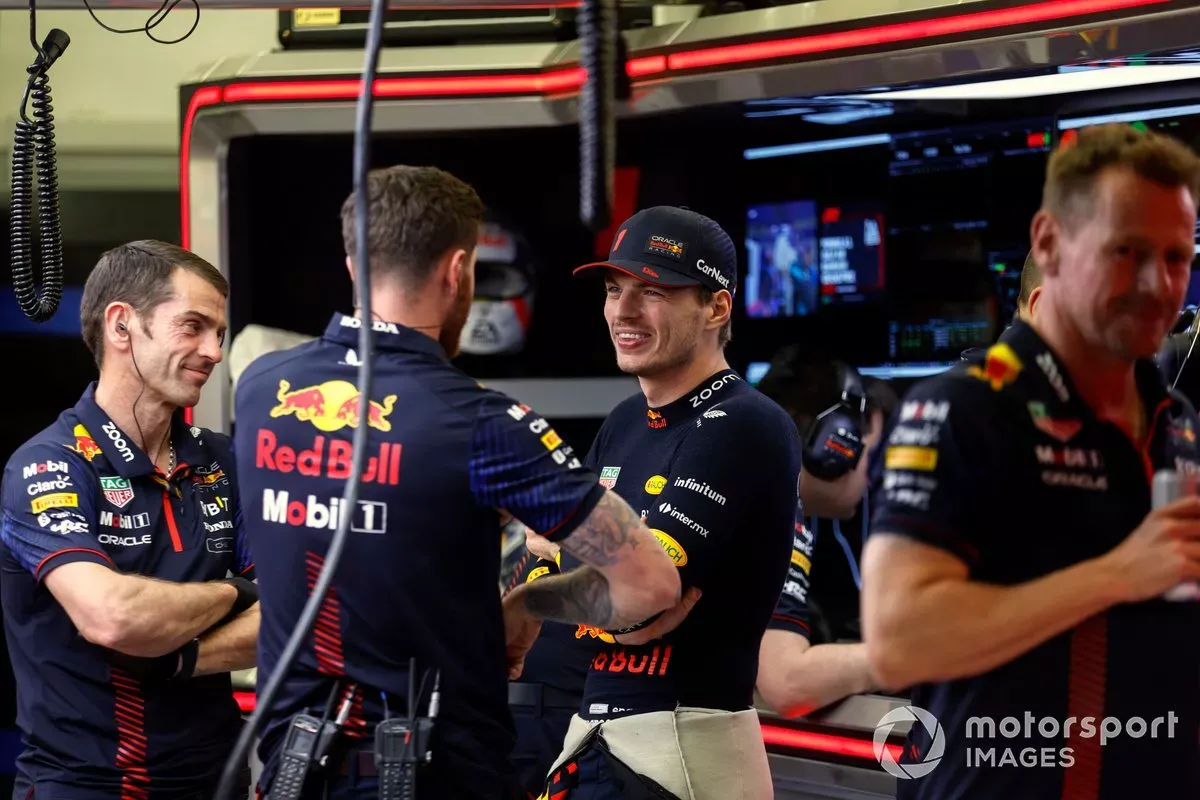
Fernando Alonso: “At the moment we are just concentrating on ourselves. Still a lot of things to improve in the car. The balance was not completely perfect today.
“It’s another step into the right direction. The car still feels good. We need to wait and see. At the moment there is not much focus on times because we have to improve a few things on the car in terms of set-up.
“I'm not thinking that high [about pole potential] to be honest. Actually, I don't know exactly what position will be a good one for us.”
Charles Leclerc: “I don’t think we have the performance maybe for pole. But we can be in the mix and whenever we have races that are a bit more difficult we should be here and try and take every opportunity so that’s what we’ll try to do this weekend.
“[On race pace] That’s where I think we have most work to do but again, it is very difficult to know what the others are running. We know what we running and there’s a bit of margin but we need to wait and see for Sunday. But there’s still things to improve.”
Lewis Hamilton: “We found out we're a long way off. So, we kind of have kind of knew that a little bit in the test. But it's a big gap. I'm trying everything I can out there. But just, it is what it is. And so, we've just got to try at work at it.
“I think I got the car to the best place I can get it setup wise. So, we'll continue to tweak little bits here and there. But yeah, it's going to be small bits here and there, which is milliseconds. It's not going to be the closing of the gap of a second.
“We're kind of either where we were last year, [or] if not a little bit further behind.”
